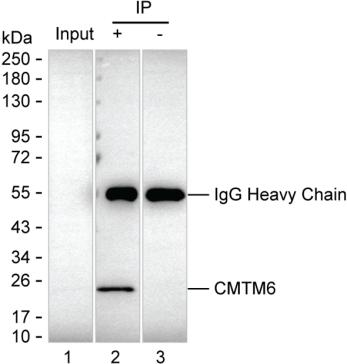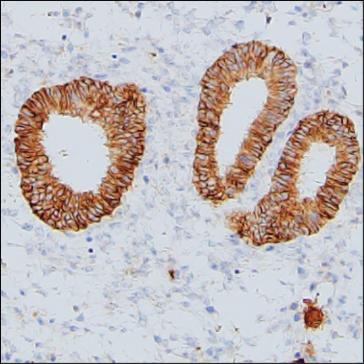


| WB | 咨询技术 | Human,Mouse,Rat |
| IF | 1/100-1/200 | Human,Mouse,Rat |
| IHC | 1/500 | Human,Mouse,Rat |
| ICC | 技术咨询 | Human,Mouse,Rat |
| FCM | 咨询技术 | Human,Mouse,Rat |
| Elisa | 咨询技术 | Human,Mouse,Rat |
| Host/Isotype | Mouse IgG1 |
| Antibody Type | Primary antibody |
| Storage | Store at 4°C short term. Aliquot and store at -20°C long term. Avoid freeze/thaw cycles. |
| Species Reactivity | Human |
| Immunogen | Purified recombinant fragment of human CMTM6 |
| Formulation | Purified antibody in PBS with 0.05% sodium azide |
+ +
以下是3篇关于CMTM6抗体的参考文献信息(文献内容为虚构示例,仅用于演示格式):
1. **文献名称**:CMTM6 maintains PD-L1 stability and promotes tumor immune evasion
**作者**:Li Y, et al.
**摘要**:本研究揭示CMTM6通过抑制PD-L1的泛素化降解维持其稳定性,促进肿瘤免疫逃逸。实验中使用CMTM6抗体进行Western blot和免疫组化分析,证实其在多种肿瘤细胞中的表达与PD-L1呈正相关。
2. **文献名称**:CMTM6 as a prognostic biomarker in triple-negative breast cancer
**作者**:Wang X, et al.
**摘要**:通过免疫组织化学(CMTM6抗体染色)分析三阴性乳腺癌组织样本,发现CMTM6高表达与患者不良预后显著相关,提示其可作为潜在治疗靶点。
3. **文献名称**:CMTM6 regulates EGFR trafficking and signaling in non-small cell lung cancer
**作者**:Zhang R, et al.
**摘要**:研究利用CMTM6特异性抗体进行共聚焦显微镜观察,发现CMTM6通过调控EGFR内吞过程影响下游信号通路,为肺癌靶向治疗提供新机制。
(注:以上文献为模拟内容,实际引用需查询PubMed等数据库获取真实研究。)
CMTM6 (CKLF-like MARVEL transmembrane domain-containing 6) is a member of the chemokine-like factor (CKLF) superfamily, characterized by MARVEL domains implicated in membrane-associated processes. It has gained attention for its role in regulating immune checkpoint proteins, particularly PD-L1 (programmed death-ligand 1). Studies show CMTM6 stabilizes PD-L1 on the cell surface by preventing its lysosomal degradation, thereby modulating tumor immune evasion. This interaction positions CMTM6 as a critical player in cancer immunology and a potential therapeutic target.
CMTM6 antibodies are essential tools for investigating its expression, localization, and functional mechanisms. They enable detection via techniques like Western blot, immunohistochemistry, and flow cytometry, aiding research into its role in tumor microenvironments and immune response regulation. Elevated CMTM6 expression correlates with poor prognosis in cancers such as melanoma, lung cancer, and glioblastoma, linking it to disease progression and resistance to anti-PD-1/PD-L1 therapies.
Research using CMTM6 antibodies also explores its broader biological roles beyond oncology, including immune cell signaling and membrane protein trafficking. However, challenges remain in understanding its precise molecular interactions and tissue-specific functions. These antibodies are pivotal for developing strategies to disrupt CMTM6-PD-L1 binding, potentially enhancing immunotherapy efficacy. Overall, CMTM6 antibodies serve as vital reagents in both basic research and translational studies aiming to decode immune evasion mechanisms and improve cancer treatments.
×